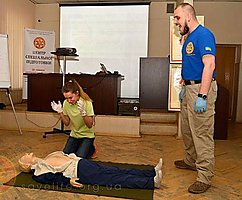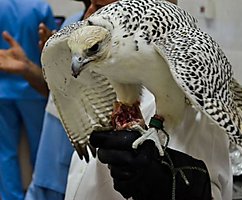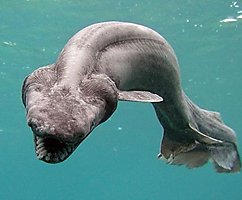Pomors
 Bashny.Net
Bashny.Net
In 1766, in St. Petersburg in French published a book about the adventures and courage of Russian sailors storm listed on Svalbard (Grumant). The author - a scientist Pierre Louis Leroy, who lived from 1731 year in Russia, he was invited as a teacher to his son "favorites" Biron.
Leroy book aroused great interest throughout the world, it began to be translated into different languages. In Russian it first appeared in 1772 and was titled: "The Adventures of four Russian sailors to the island of Spitsbergen East brought a storm, where they are six years and three months lived».
Here is a brief history of polar Robinson.
In the summer of 1743 a resident of Mezen Arkhangelsk province Jeremiah Okladnikov fitted out and sent for fishing in the northern seas whales, walruses and seals the vessel with a crew of fourteen people. Trade sea animals wore an international character, and the fishing has been very beneficial. The ship headed for Svalbard and the first eight days went easily, quickly, with a favorable wind. On the ninth day the wind changed direction, Russian sailors drifted east. Rather than approach the coast of West Spitsbergen, where ships molested Dutch, British, Swedish, Russian sailors were close to one of the islands east of Spitsbergen, known from coast-dwellers called Small Brun (or Edge). Actually same Svalbard was called Pomors big Brun.

Pomors ship hit the ice trap. The situation became more and more dangerous. Decided to go ashore. Korschik (ie kormschik or navigator) Alex Chem-ing remembered that a few years ago, residents of Mezen wintered on the island. They came here with the already prepared construction material, built the house on the island, lived and hunted here. This chalet could survive.
In trouble Pomors sent to the island of the four scouts - Alexei Himkova 47 years old, his godson Ivan Himkova 23 years, sailor Stepan Sharapova 35 years and sailor Fedor Verigin 30 years.
The shore was about four miles away. But every step is threatened with destruction. We had to wade through ice ridges - piling rearing floes through the treacherous snow-powdered gaps and cracks. In the road took only the most necessary: very little food, gun powder horn with 12 charges and the same bullets, an ax, a small pot, 20 pounds of flour in the bag, ognyanku (brazier), a piece of tinder and flint knife, bubble-packed Smoking tobacco, yes wooden tube for each.
When they reached the island, sailors soon found the hut, located two miles from the shore. It was a fairly large: approximately 6 fathoms (seven feet - 2, 13 meters) long and about 3 yards in width and height. The hut was divided into an upper room and porch. In the upper room was a Russian stove, which been heated in black. Smoke came out to open the door or through small windows cut through the walls to the height of the head of a seated person. Smoke went outside, not falling below the windows, and therefore does not cause the people sitting in the house, much inconvenience. When finishing sink, windows sealed board. On the stove could sleep.
Sailors was overjoyed by finding a haven. Shivering, somehow spent the night there, and in the morning rushed to the beach to share with his friends the news of his good fortune to
all together to move the ship to the island food, weapons and equipment.
What was their horror when, coming ashore, at the very place where yesterday landed, they saw their ship! Before them was quite clean sea ice. Hurricane raged through the night, broke, scattered ice hummocks. Fierce storm broke any ship or with ice, which he pinned down, took to the open sea. The more they have never seen their comrades.
In desperation, the sailors returned to the hut. Immediately had to think about food, housing. Twelve charges of gunpowder, which they were, it was possible to shoot twelve saiga - reindeer, there were a lot of them around the island. So, eating ka some time enough.
It was necessary to somehow insulate the house, and to patch numerous huge gap. On the island of moss grew in abundance. They caulked wall. Fortunately, there was an ax. Logs were strong, not rotten. Well, to repair the house with his own hands - the usual peasant business.
Than to heat the home? No trees or shrubs on the arctic island, of course, did not grow. On the shore found a lot of cast ashore wooden wrecks, shipwrecked. Sometimes across the whole uprooted trees nowhere recorded on the island.
Once one of the sailors found a board with nails driven into her and a thick iron hook. This proved to be very useful. Gunpowder was not there. Meat slaughtered deer coming to an end. People threatened with starvation. Decided to make spears to hunt and defend themselves against polar bears, which is becoming intrusive and arrogant.
To forge tips for spears and arrows, needed a hammer.
In the iron hook, which found together with the board, it was at the end of the hole, it increased, drove it and handle the thickest nail. The result was a hammer. Anvil serves more cobblestones. Ticks have built two antlers. With these primitive tools to forge two large iron tip. Then polished and sharpened them on the rocks. Spears turned out strong, reliable, with their help could repel the attacks of polar bears. Meat bears, deer, foxes saved people from starvation. Animal skins from the polar cold. Unusually strong bearish tendon was used as the string to the bow, they also sewed clothes made of animal skins.
Besides the two large iron tips for spears, sailors forge four small arrowheads, polished, sharpened and firmly attached to the tips of arrows by using strings of bear tendons. Arrows even decorated feathers.
Using only these weapons, they are for more than six years fed and clothed themselves. Polar bears have killed a total of ten, and each time with great risk to himself.
Had to eat half-baked meat, because the fuel was most precious. No salt, no bread, no cereal they did not have.
To somehow diversify food, invented to smoke meat by hanging it to the wall inside the hut and above the roof, where it could not reach the polar bears. Summer in the air dried out meat perfectly and becomes something like a bit of bread.
In the lack of drinking did not experience, it appears that many keys on the island. Winter melted in the cauldron of snow or ice.
Terrible threat loomed scurvy (scurvy). Sailor Ivan Khimki, who used to spend the winter on the coast east of Spitsbergen, advised his companions to chew Cochlear or lozhechnuyu grass, which is often found on the island, still warm drink deer blood coming out of the slaughtered animal, advised, as much as possible to move.
These funds have helped. Moreover, the islanders began to notice a surprising, unprecedented mobility. So, Ivan Khimki, the youngest of them, began to run with astonishing ease and speed. Sailor Fedor Verigin was unable to overcome the aversion to deer blood. In addition, he was by nature too stationary, slow, could not actively resist disease. He fell ill with scurvy before anyone else. The disease has progressed. Suffering severely, he grew weaker every day. Then could not get out of bed, or even to bring his hand to his mouth. Comrades fed him as a small child. Verigin died in winter 1748. This death grieved all.
The islanders were soon be completely naked, if not switched on clothes from animal skins. They slept on the deer and fox skins, hides refuge. But it was necessary to fabricate the skin, tan. Pomors them soaked in fresh water, kneaded and rubbed his hands sop skin covering them with melted fat deer, then squeezed again until they become soft and flexible.
To sew clothes made of fur or leather, needed an awl and needle. Had they forge, grind. Great pains to drill needle ears, and yet they do not get flat and smooth. Threads (cores) every now and then exploded in the ears.
Island, coast-dwellers captivated quite large - 150-170 miles in diameter, it lies between 77 ° 25 'and 78 ° 45' north latitude, or, in the words of Leroy, "between the end of the third and beginning of the fourth climate." Polar day lasts there for four months.
Stay on the island were Pomors calendar. They considered it very important to know exactly religious holidays. As the years passed, infinitely long polar night gave way to the polar days when the sun for four months from going beyond the horizon. It's not wise to lose count. Nevertheless, their calendar was quite accurate. When August 15 (old style) came to the island vessel which finally returned to his homeland coast-dwellers, their calendar was August.
One can only wonder what the error was so small. The islanders had no clock, no solar or lunar quadrant. The question Leroy, as they still determines the time Alex Khimki vehemently replied, "How did I would be captain if he could not determine the height of the sun, when it is seen, and the movement of the stars, when there is no sun ?! I made myself stick for this purpose, similar to the one which left the ship, and it served me for my observation. " This was the so-called Jacob's staff, or gradshtok primitive goniometric tools used by sailors (until the end of the XVIII century) to determine the time of day.
Leroy, from the words of the sailors, and tells about the natural environment of the island. He argues that Svalbard is a solid ground, not the accumulation of ice, but the ground there forever frozen. Speaks of the mountains and the rocks of the island, that no vegetation except lozhechnoy grass and moss, is not there. In the center of the island - the layers of clay. Sure, there are, as he thinks, iron ore. Rivers on the island there, and streams, keys and many sources. Banks are covered with sand and pebbles.
Starting from mid-November until the beginning of January, or as they say Pomors, from the beginning of fasting before the feast of St. Philip baptism was usually incessant rain. At this time, the weather was quite mild, with no severe cold. But then began unbearable cold, especially in the south wind from the mainland. Leroy explains this phenomenon as follows: "The south wind from the mainland, passing over Europe, covered with snow, very cool, north the wind passing over open seas and attracting the pair retains more heat ... Winds over the expanses of land is always colder winds over seas in winter ».
Snow on the island dropped in large quantities. Hut swerved so that had to get out of it through the roof.
We have already talked about the animal world of the island. Bears, and whose Saiga, foxes were a great many. Summer flew thousands of birds. The sea is rich in fish. Pomors tried to catch her, dropping into the water bag from deerskin. Other fishing tackle they did not have ... Occasionally seen approaching the shores of whales. Seals and walruses as there were so many.
It was the seventh year in Russian coast-dwellers on a desert island east of Spitsbergen. And finally came the day of release. People saw the ship approaching the island. Ship, as it turned out, belonged to the Russian merchant. It went from Arkhangelsk. Fortunately for our islanders, the wind drove the ship is not the western and the eastern Spitsbergen, the island Small Brun, almost to the same place where they landed. Kindled fires on the island, waving spears and skins. Very worried: what they see and pass by. On the ship noticed signals kormschik changed course, and the ship, despite the dangerous pitfalls came to the shore.
There is no need to describe the joy of the people, liberated from the hard years of captivity. They begged the captain to take them to the service of sailors. And for the delivery of the property pledged to return home to pay eighty rubles. Pomors loaded onto a ship and fifty pounds of reindeer fat, two hundred deer hides, skins more than two hundred white and blue foxes, bearskins ... Do not forget to take his bow and arrows, spears, lamp, his ax and knife much ground off, homemade needles, belts - in short, all that they had and what got.
September 28, 1749 with the rescued Pomors ship arrived in Arkhangelsk.
The time of their arrival almost became tragic for Alexei Himkova. When the boat came up to the dock, Alex Khimki, Khimki Ivan and Stepan Sharapov stood on the deck of a fantastic clothes made of precious skins, overgrown and changed, but strong, brave and invincible, like the heroes of northern saga. One of the women who met the ship - it was the wife Alexei Himkova - suddenly found her husband, who mourned for many years, counting the dead. The poor woman could not help it, she threw herself into the water, that they might get to the ship, and nearly drowned.
Things equipment brought from the island, came to some Vernezoberu - Arkhangelsk office manager greasy bargaining. A bargaining belonged favorite of Empress Elizabeth, Count PI Shuvalov Vernezober sent received from sailors things Shuvalov, who handed them over to Leroy St. Petersburg.
History of Russian sailors who have spent more than six years on a desert island north, interested professor of Russian Academy of Sciences Special Commission questioned the sailors about their stay on the island. Alexis and Ivan Himkovyh summoned to St. Petersburg. Some doubts have arisen had the committee members about the reliability told Alex Khimki managed to dispel. The Commission has specified the location of the island. It has been firmly established that Pomorie is located in Svalbard, and not on Bear Island. This proves conclusively marked with the date of the first appearance of the sun after the polar night, and his disappearance, when the polar day is over. Follow the expedition confirmed the accuracy of all narrated Pomerania and even found the house in which they lived.
In concluding his narrative, Leroy says that tests that befell the Russian sailors were much more difficult ones that survived the hero of the book Dzfo - Robinson Crusoe. Russian sailors were abandoned on the polar island hardships that fell to their lot, sometimes seem insurmountable.
Yet they survived ...
Leroy book aroused great interest throughout the world, it began to be translated into different languages. In Russian it first appeared in 1772 and was titled: "The Adventures of four Russian sailors to the island of Spitsbergen East brought a storm, where they are six years and three months lived».
Here is a brief history of polar Robinson.
In the summer of 1743 a resident of Mezen Arkhangelsk province Jeremiah Okladnikov fitted out and sent for fishing in the northern seas whales, walruses and seals the vessel with a crew of fourteen people. Trade sea animals wore an international character, and the fishing has been very beneficial. The ship headed for Svalbard and the first eight days went easily, quickly, with a favorable wind. On the ninth day the wind changed direction, Russian sailors drifted east. Rather than approach the coast of West Spitsbergen, where ships molested Dutch, British, Swedish, Russian sailors were close to one of the islands east of Spitsbergen, known from coast-dwellers called Small Brun (or Edge). Actually same Svalbard was called Pomors big Brun.

Pomors ship hit the ice trap. The situation became more and more dangerous. Decided to go ashore. Korschik (ie kormschik or navigator) Alex Chem-ing remembered that a few years ago, residents of Mezen wintered on the island. They came here with the already prepared construction material, built the house on the island, lived and hunted here. This chalet could survive.
In trouble Pomors sent to the island of the four scouts - Alexei Himkova 47 years old, his godson Ivan Himkova 23 years, sailor Stepan Sharapova 35 years and sailor Fedor Verigin 30 years.
The shore was about four miles away. But every step is threatened with destruction. We had to wade through ice ridges - piling rearing floes through the treacherous snow-powdered gaps and cracks. In the road took only the most necessary: very little food, gun powder horn with 12 charges and the same bullets, an ax, a small pot, 20 pounds of flour in the bag, ognyanku (brazier), a piece of tinder and flint knife, bubble-packed Smoking tobacco, yes wooden tube for each.
When they reached the island, sailors soon found the hut, located two miles from the shore. It was a fairly large: approximately 6 fathoms (seven feet - 2, 13 meters) long and about 3 yards in width and height. The hut was divided into an upper room and porch. In the upper room was a Russian stove, which been heated in black. Smoke came out to open the door or through small windows cut through the walls to the height of the head of a seated person. Smoke went outside, not falling below the windows, and therefore does not cause the people sitting in the house, much inconvenience. When finishing sink, windows sealed board. On the stove could sleep.
Sailors was overjoyed by finding a haven. Shivering, somehow spent the night there, and in the morning rushed to the beach to share with his friends the news of his good fortune to
all together to move the ship to the island food, weapons and equipment.
What was their horror when, coming ashore, at the very place where yesterday landed, they saw their ship! Before them was quite clean sea ice. Hurricane raged through the night, broke, scattered ice hummocks. Fierce storm broke any ship or with ice, which he pinned down, took to the open sea. The more they have never seen their comrades.
In desperation, the sailors returned to the hut. Immediately had to think about food, housing. Twelve charges of gunpowder, which they were, it was possible to shoot twelve saiga - reindeer, there were a lot of them around the island. So, eating ka some time enough.
It was necessary to somehow insulate the house, and to patch numerous huge gap. On the island of moss grew in abundance. They caulked wall. Fortunately, there was an ax. Logs were strong, not rotten. Well, to repair the house with his own hands - the usual peasant business.
Than to heat the home? No trees or shrubs on the arctic island, of course, did not grow. On the shore found a lot of cast ashore wooden wrecks, shipwrecked. Sometimes across the whole uprooted trees nowhere recorded on the island.
Once one of the sailors found a board with nails driven into her and a thick iron hook. This proved to be very useful. Gunpowder was not there. Meat slaughtered deer coming to an end. People threatened with starvation. Decided to make spears to hunt and defend themselves against polar bears, which is becoming intrusive and arrogant.
To forge tips for spears and arrows, needed a hammer.
In the iron hook, which found together with the board, it was at the end of the hole, it increased, drove it and handle the thickest nail. The result was a hammer. Anvil serves more cobblestones. Ticks have built two antlers. With these primitive tools to forge two large iron tip. Then polished and sharpened them on the rocks. Spears turned out strong, reliable, with their help could repel the attacks of polar bears. Meat bears, deer, foxes saved people from starvation. Animal skins from the polar cold. Unusually strong bearish tendon was used as the string to the bow, they also sewed clothes made of animal skins.
Besides the two large iron tips for spears, sailors forge four small arrowheads, polished, sharpened and firmly attached to the tips of arrows by using strings of bear tendons. Arrows even decorated feathers.
Using only these weapons, they are for more than six years fed and clothed themselves. Polar bears have killed a total of ten, and each time with great risk to himself.
Had to eat half-baked meat, because the fuel was most precious. No salt, no bread, no cereal they did not have.
To somehow diversify food, invented to smoke meat by hanging it to the wall inside the hut and above the roof, where it could not reach the polar bears. Summer in the air dried out meat perfectly and becomes something like a bit of bread.
In the lack of drinking did not experience, it appears that many keys on the island. Winter melted in the cauldron of snow or ice.
Terrible threat loomed scurvy (scurvy). Sailor Ivan Khimki, who used to spend the winter on the coast east of Spitsbergen, advised his companions to chew Cochlear or lozhechnuyu grass, which is often found on the island, still warm drink deer blood coming out of the slaughtered animal, advised, as much as possible to move.
These funds have helped. Moreover, the islanders began to notice a surprising, unprecedented mobility. So, Ivan Khimki, the youngest of them, began to run with astonishing ease and speed. Sailor Fedor Verigin was unable to overcome the aversion to deer blood. In addition, he was by nature too stationary, slow, could not actively resist disease. He fell ill with scurvy before anyone else. The disease has progressed. Suffering severely, he grew weaker every day. Then could not get out of bed, or even to bring his hand to his mouth. Comrades fed him as a small child. Verigin died in winter 1748. This death grieved all.
The islanders were soon be completely naked, if not switched on clothes from animal skins. They slept on the deer and fox skins, hides refuge. But it was necessary to fabricate the skin, tan. Pomors them soaked in fresh water, kneaded and rubbed his hands sop skin covering them with melted fat deer, then squeezed again until they become soft and flexible.
To sew clothes made of fur or leather, needed an awl and needle. Had they forge, grind. Great pains to drill needle ears, and yet they do not get flat and smooth. Threads (cores) every now and then exploded in the ears.
Island, coast-dwellers captivated quite large - 150-170 miles in diameter, it lies between 77 ° 25 'and 78 ° 45' north latitude, or, in the words of Leroy, "between the end of the third and beginning of the fourth climate." Polar day lasts there for four months.
Stay on the island were Pomors calendar. They considered it very important to know exactly religious holidays. As the years passed, infinitely long polar night gave way to the polar days when the sun for four months from going beyond the horizon. It's not wise to lose count. Nevertheless, their calendar was quite accurate. When August 15 (old style) came to the island vessel which finally returned to his homeland coast-dwellers, their calendar was August.
One can only wonder what the error was so small. The islanders had no clock, no solar or lunar quadrant. The question Leroy, as they still determines the time Alex Khimki vehemently replied, "How did I would be captain if he could not determine the height of the sun, when it is seen, and the movement of the stars, when there is no sun ?! I made myself stick for this purpose, similar to the one which left the ship, and it served me for my observation. " This was the so-called Jacob's staff, or gradshtok primitive goniometric tools used by sailors (until the end of the XVIII century) to determine the time of day.
Leroy, from the words of the sailors, and tells about the natural environment of the island. He argues that Svalbard is a solid ground, not the accumulation of ice, but the ground there forever frozen. Speaks of the mountains and the rocks of the island, that no vegetation except lozhechnoy grass and moss, is not there. In the center of the island - the layers of clay. Sure, there are, as he thinks, iron ore. Rivers on the island there, and streams, keys and many sources. Banks are covered with sand and pebbles.
Starting from mid-November until the beginning of January, or as they say Pomors, from the beginning of fasting before the feast of St. Philip baptism was usually incessant rain. At this time, the weather was quite mild, with no severe cold. But then began unbearable cold, especially in the south wind from the mainland. Leroy explains this phenomenon as follows: "The south wind from the mainland, passing over Europe, covered with snow, very cool, north the wind passing over open seas and attracting the pair retains more heat ... Winds over the expanses of land is always colder winds over seas in winter ».
Snow on the island dropped in large quantities. Hut swerved so that had to get out of it through the roof.
We have already talked about the animal world of the island. Bears, and whose Saiga, foxes were a great many. Summer flew thousands of birds. The sea is rich in fish. Pomors tried to catch her, dropping into the water bag from deerskin. Other fishing tackle they did not have ... Occasionally seen approaching the shores of whales. Seals and walruses as there were so many.
It was the seventh year in Russian coast-dwellers on a desert island east of Spitsbergen. And finally came the day of release. People saw the ship approaching the island. Ship, as it turned out, belonged to the Russian merchant. It went from Arkhangelsk. Fortunately for our islanders, the wind drove the ship is not the western and the eastern Spitsbergen, the island Small Brun, almost to the same place where they landed. Kindled fires on the island, waving spears and skins. Very worried: what they see and pass by. On the ship noticed signals kormschik changed course, and the ship, despite the dangerous pitfalls came to the shore.
There is no need to describe the joy of the people, liberated from the hard years of captivity. They begged the captain to take them to the service of sailors. And for the delivery of the property pledged to return home to pay eighty rubles. Pomors loaded onto a ship and fifty pounds of reindeer fat, two hundred deer hides, skins more than two hundred white and blue foxes, bearskins ... Do not forget to take his bow and arrows, spears, lamp, his ax and knife much ground off, homemade needles, belts - in short, all that they had and what got.
September 28, 1749 with the rescued Pomors ship arrived in Arkhangelsk.
The time of their arrival almost became tragic for Alexei Himkova. When the boat came up to the dock, Alex Khimki, Khimki Ivan and Stepan Sharapov stood on the deck of a fantastic clothes made of precious skins, overgrown and changed, but strong, brave and invincible, like the heroes of northern saga. One of the women who met the ship - it was the wife Alexei Himkova - suddenly found her husband, who mourned for many years, counting the dead. The poor woman could not help it, she threw herself into the water, that they might get to the ship, and nearly drowned.
Things equipment brought from the island, came to some Vernezoberu - Arkhangelsk office manager greasy bargaining. A bargaining belonged favorite of Empress Elizabeth, Count PI Shuvalov Vernezober sent received from sailors things Shuvalov, who handed them over to Leroy St. Petersburg.
History of Russian sailors who have spent more than six years on a desert island north, interested professor of Russian Academy of Sciences Special Commission questioned the sailors about their stay on the island. Alexis and Ivan Himkovyh summoned to St. Petersburg. Some doubts have arisen had the committee members about the reliability told Alex Khimki managed to dispel. The Commission has specified the location of the island. It has been firmly established that Pomorie is located in Svalbard, and not on Bear Island. This proves conclusively marked with the date of the first appearance of the sun after the polar night, and his disappearance, when the polar day is over. Follow the expedition confirmed the accuracy of all narrated Pomerania and even found the house in which they lived.
In concluding his narrative, Leroy says that tests that befell the Russian sailors were much more difficult ones that survived the hero of the book Dzfo - Robinson Crusoe. Russian sailors were abandoned on the polar island hardships that fell to their lot, sometimes seem insurmountable.
Yet they survived ...
Tags
See also
On an inflatable tower - space
Stratagem (2 photos)
Stratagem: the corpse of poor deceived Nazis
Scientists and magicians disclosed a method of deception of the mind
About this Alexander Nevsky.
The book "Why is he doing this?" Lundy Bancroft - read women!
Analysis of "Martian": Mars, science, politics
The tranquility of Zen and how to preserve it
The first months of the war. Year 1941 th (99 photos + text)
French Pastorale
















